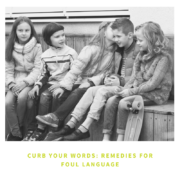Curb Your Words: Remedies for Foul Language
For preschoolers and early elementary-age children, “bad words” might range from potty language and/or bodily function-themed terms to outright curse words. In most instances, youngsters are experimenting with language from a few different angles. 1) They are likely completely unaware of what these adult curse words mean, but they are using them simply because they have heard them from someone; it’s a new term for them to try out. 2) They are preoccupied with “gross” conversations because they have witnessed the giggly or embarrassed reactions from their parents, i.e., they’re just being ornery. 3) They are experimenting with pushing boundaries and testing limits of what they can and cannot get away with saying.
In instances when children naively blurt out a curse word, but clearly have no idea what the word means or how it is inappropriate, parents should tread lightly. Try ignoring the word this first time. A reaction, whether amusement, embarrassment, or outrage could inadvertently reinforce the behavior. If your child uses the word again, it’s time to have a brief but firm conversation. Explain to him that those sorts of words are inappropriate and unkind. Firmly state that he should not use them anytime.
If your child says something hurtful to or about someone else, explain how unkind comments can really upset others. Social-emotional skills are still developing at this early age, so empathy needs to be explicitly taught. Ask your child how she would feel if someone called her “ugly” or “dumb.” Segue to a conversation about appropriate ways to express feelings without name-calling. Then discuss the importance of a genuine apology when someone’s feelings are hurt.
Make sure to practice what you preach at home. We all slip with our words, especially during emotionally intense moments. However, it is important to acknowledge your own mistake to solidify expectations at home. Correct yourself so that your child knows that rules about “bad words” apply to the whole family. With older siblings, it is especially important to have a separate conversation about setting a good example with younger brothers and sisters. Explain that, like it or not, younger siblings look up to their big brothers and sisters—so they must be careful about what they are saying and doing around impressionable siblings.
Parents can also preemptively intervene by monitoring what children are listening to with regard to music, movies, and television. Too often, we adults are desensitized to the inappropriate nature of our favorite songs and shows. If we’re not careful, children will follow our lead and sing along to distasteful lyrics, unknowingly spouting any number of inappropriate terms. Preprogram kid-friendly radio stations and set restrictions on live and streaming TV options. Remember that sites such as YouTube can also be set with restrictions.




